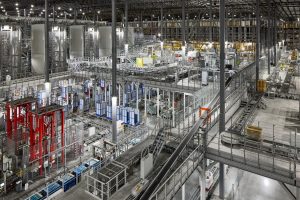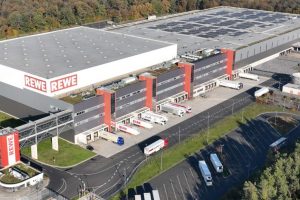Parts supplier consolidates UK warehouses in wake of Brexit
Bilstein group has been operating a 19,000 square metre distribution centre in Markham Vale supplying the UK market since 2018.
More than 50,000 different products are stored here. Those customers who order by 5:30pm, receive their parts the next day. Same-day collections are also possible.
Paul Dodgson, operations director at Ferdinand Bilstein UK and Felix Wortmann, project manager logistics planning at Ferdinand Bilstein Germany explain how the company reacted to Brexit and why automation is the big winner in England.

“We have centralised our logistics operations in Markham Vale. Before we supplied our UK customers from two distribution centres, one in the north, the other in the south of England. Operations were quite complex as the parts have been stored in separate warehouses within the sites. Consolidation of ready-to-ship pallets and packages was time and effort consuming. Now we ship all brands from one site”, says Felix.
“We had wanted to establish in the South of England in order to supply both the UK and the continent,” explains Felix.

The Brexit vote, however, took Ferdinand Bilstein and the logistics team to the geographical centre of England. The original planned supply to the continent was no longer feasible, and the strategy switched to a new consolidated warehouse to supply the UK.
Witron’s delivery and performance scope includes the design and realisation of all material flows, IT, control, warehouse management, and mechanical components. The conveyor technology and stacker cranes were designed and produced by Witron's subsidiary, FAS. A Witron OnSite team is located directly at the site to take care of the entire system service and maintenance in the long run.
Changing market
The market for automotive car and truck replacement parts in the United Kingdom has changed considerably in recent years.
“We no longer have the tiny repair shop with the owner stocking a few boxes of spare parts. Our customers order less at once, but more frequently and ever later than before. Those customers who order by 5:30pm, receive their parts the next day. Our tiny repair shops have become chains with investors, shareholders and supply chain experts. Our customers’ demands range from 24-hour service to same-day delivery. Logistics has become increasingly important in our market. It is no longer the “dirty dark side” of business. We know that and our customers do too,” says Paul Dodgson.

On peak days, this means more than 2,200 packages and over 800 dispatch modules that are picked from the automated small parts warehouse (AS/RS) using pick-to-tote according to the goods-to-person principle. “This corresponds to 38,000 orderlines with a total of 152,000 pick units”. At 11 pick workstations with downstream packing workstations, the picked orders are prepared for dispatch in cartons or in dispatch modules.
Due to this broad and inhomogeneous product range in the automotive replacement parts business – the logistics centre consists of an automated and a manual logistics area.
The automated section in Markham Vale strongly resembles the bilstein group logistics centre in Ennepetal, Germany. There too, the Order Picking System (OPS) from Witron is implemented as the central logistics element. OPS is an integration of an automated small parts warehouse (AS/RS), a distribution loop, and upstream ergonomic picking workstations. More than 90% of bilstein group’s entire order volume is handled here.
The picking system
The items are provided in the OPS according to the goods-to-person principle for order-related and sequential picking. The picker is guided seamlessly through the entire process by means of terminal dialogues. Integrated sequence buffers decouple the provision of source totes by stacker cranes from the picking process. The OPS enables storage and order picking in one system. In addition to serial 1:1 picking, parallel picking into several order totes or directly into the customer carton would also be possible. This flexibility is much appreciated by companies in the vehicle parts distribution sector, as it enables a combination of store, repair shop, and E-Commerce business.
The heart of the manual logistics area is the narrow aisle pallet warehouse with more than 10,000 pallet storage locations and integrated cantilever racks with an additional 720 storage locations. “This is where we mainly store heavy and large-volume items”, explains Dodgson. Narrow aisle stackers and a Witron radio-frequency system support the employees with route-optimised order picking. The manual warehouse – just like the OPS system – is controlled via a multi-functional Witron WMS.

In Markham Vale, the AS/RS comprises 215,000 tote storage locations spread over twelve aisles. The Witron technicians are proud that the impressive throughput values can be achieved thanks to the AS/RS equipment with one stacker crane each including a double load handling device for the handling of four totes at the same time as well as a double loop solution.
Other important work areas for packing such as workstations in the product-packing department (reboxing) and the kitting department were also integrated into the overall concept and are supplied and disposed of by the Witron system. These kitting areas are scalable and therefore flexibly expandable in the future. “Despite Brexit, our goal is to further expand,” says Dodgson, looking to the future.
As in Ennepetal, the company has decided to also integrate a Witron OnSite team in the UK. Since the distribution centre in Markham Vale is about one-third of the size of the one in Germany in terms of throughput and footprint, six technicians ensure a smooth material flow in a 1.5-shift operation.

“Following the Brexit decision, our competitors cut back their logistics capacities in England. We are still here”, Dodgson says.
“At the moment, the share of manual logistics centres in England is still very high. But that will change. Automation will benefit greatly, we will have to further automate processes, pursue Data Mining to gain more knowledge about our processes and our customers because it is already difficult for us to find well-trained and motivated people.”
{EMBED(1151683)}







